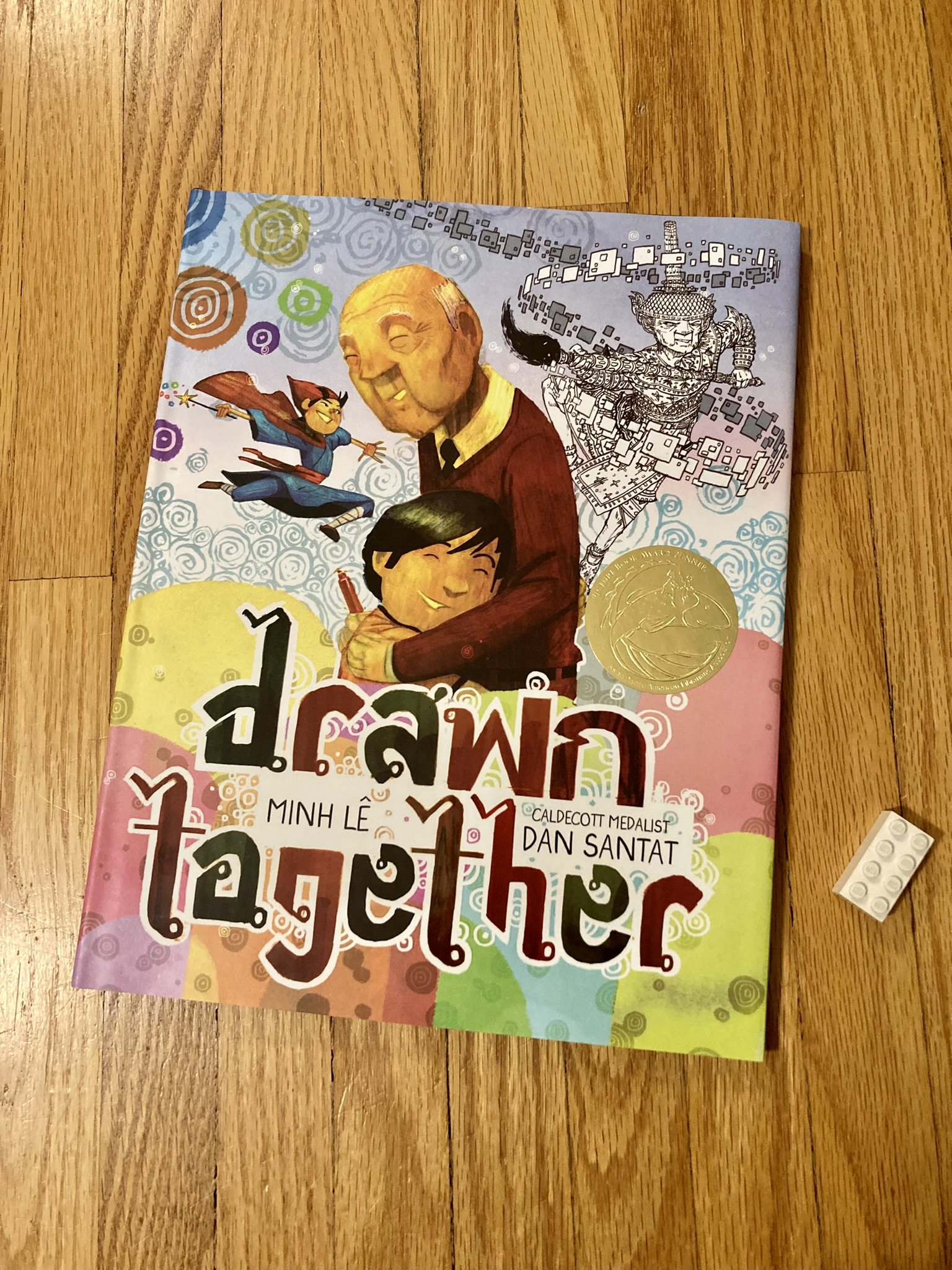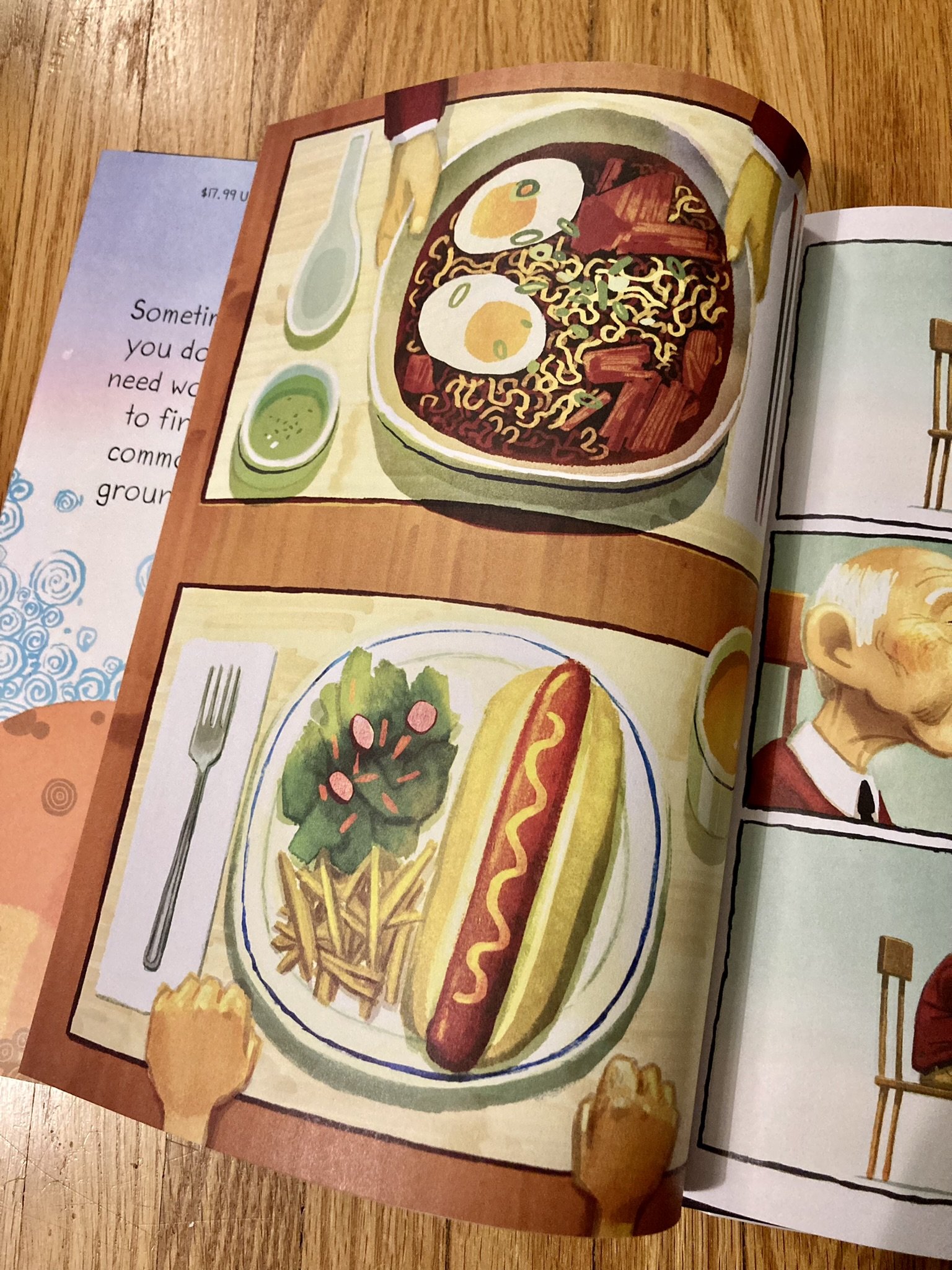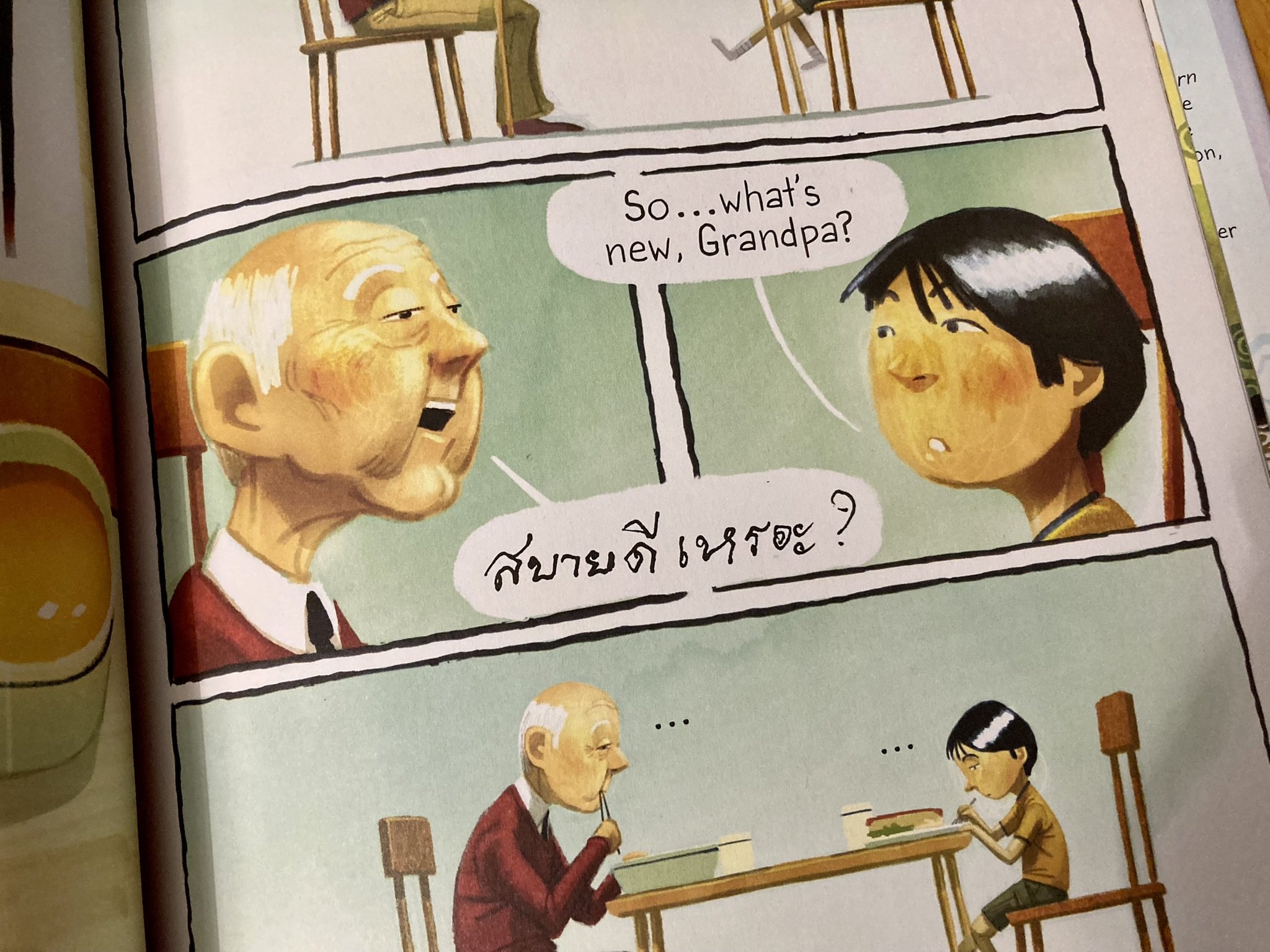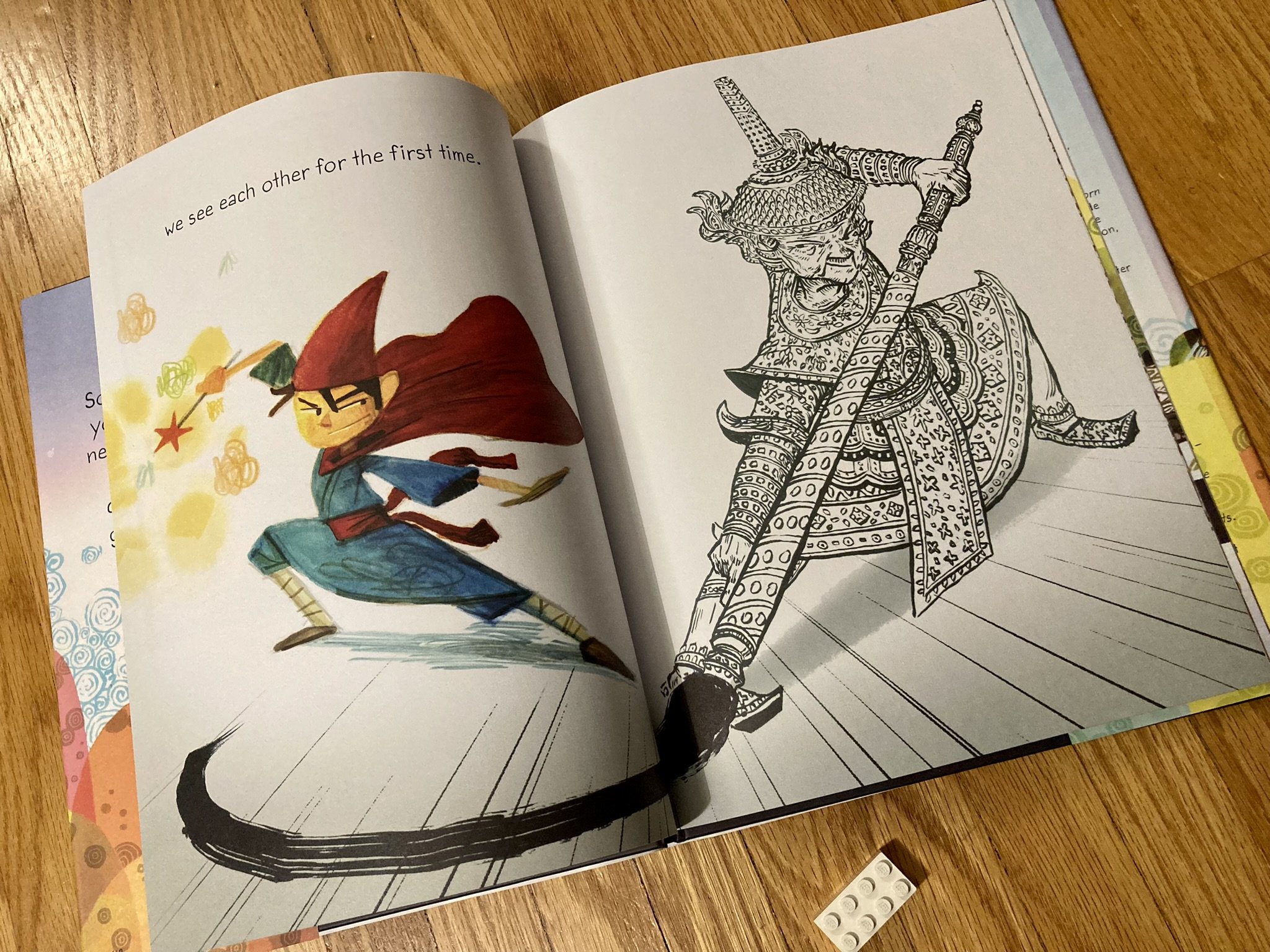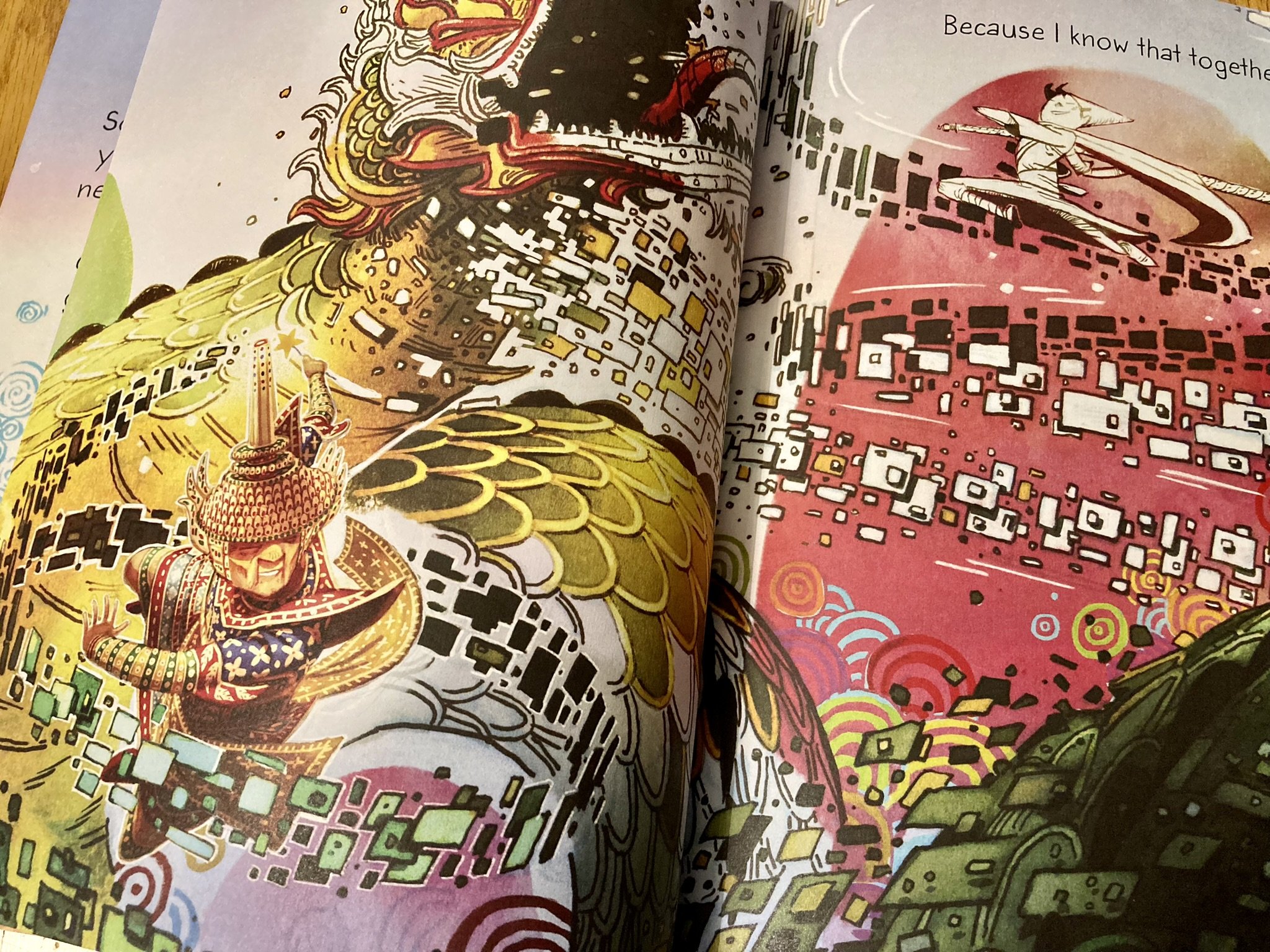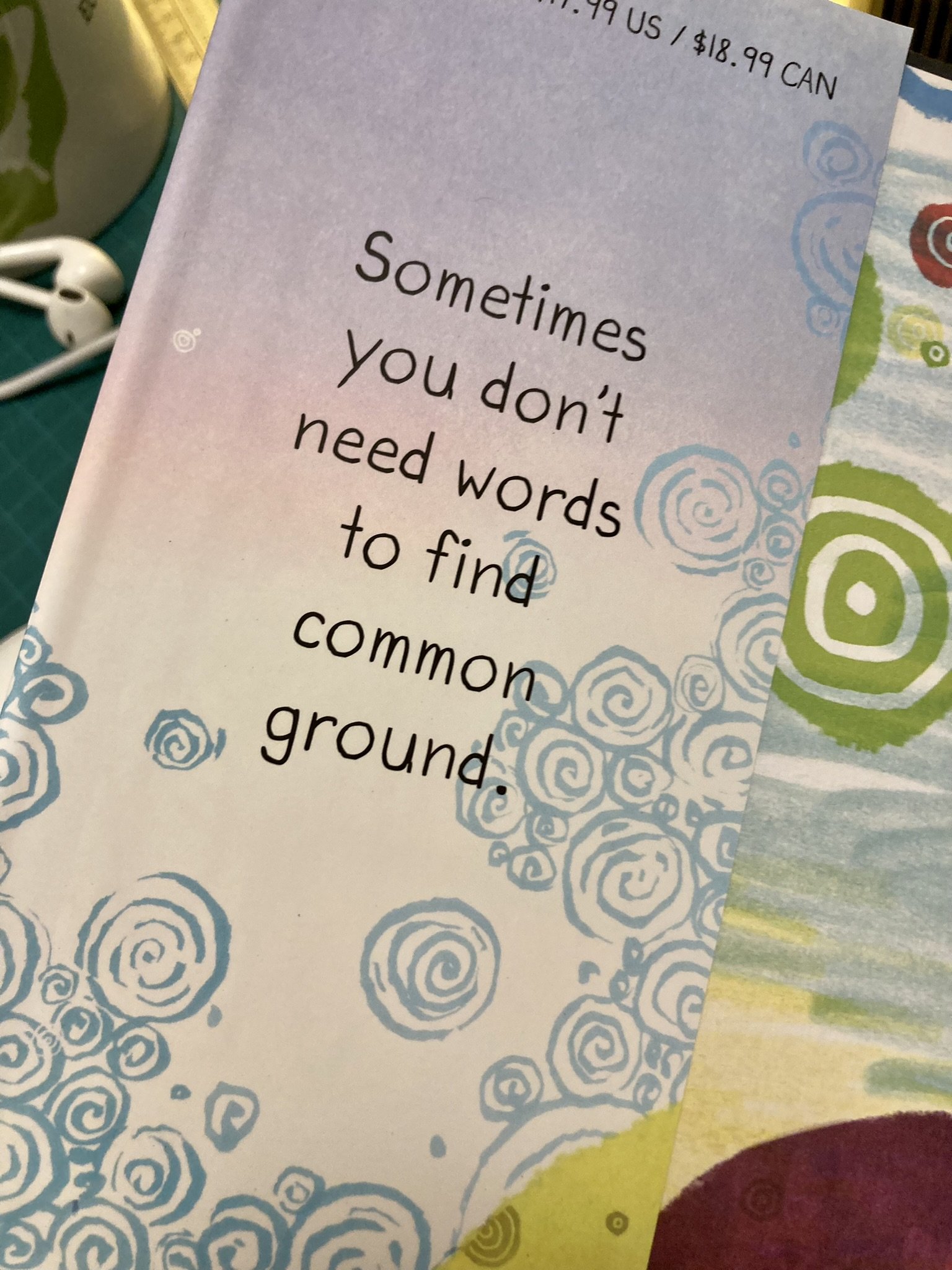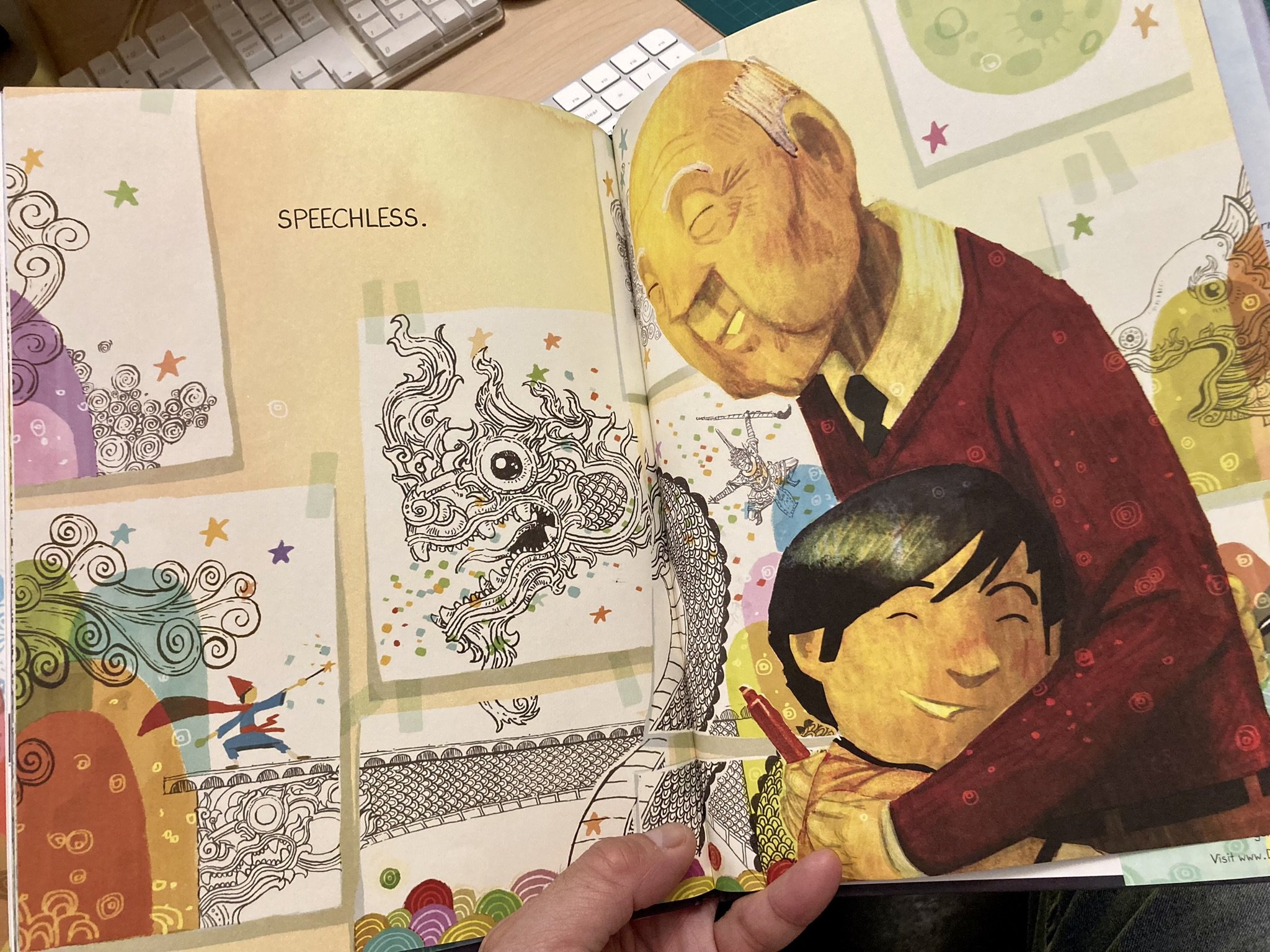Drawn Together, Judged Together
Well it’s been a hot minute since we last added something new to the stacks here at the Butterflies & Aliens Library and we thank you for your patience. It’s been a crazy couple of months outside our library walls so we just haven’t had much time to spend here, but we’re back now!
And like a lot of our recent activity, today’s post is courtesy of our Head Alien’s ongoing studies at the University of Alberta School of Library and Information Studies, this time in LIS 518: Comic Books and Graphic Novels in Schools and Public Libraries.
Today’s assignment? To investigate “a graphic novel or comic that has been challenged recently in western society.”
Our choice? Well, it’s the 2019 winner of the Asian/Pacific American Award for Best Picture Book, among other accolades. It’s received positive reviews in the School Library Journal, Kirkus Reviews, the New York Times (in a review by John Lithgow!), Publishers Weekly, and Booklist.
And it’s one of our personal favourites.
Introducing Drawn Together, written by Minh Lê and illustrated by Dan Santat, designed by Joann Hill, and published by Disney Hyperion Books in 2018.
The cover of Drawn Together.
This is a beautiful book, both for its art and its message. It tells the story of a boy and his grandfather, unable to communicate because of cultural and language barriers. Santat does a brilliant job of illustrating this in the early parts of the book through his use of comic book frames and images like these…
A page from Drawn Together, showing the boy and his grandfather’s respective meals, one a bowl of soup noodles, the other a hot dog and fries, framed by rectangular placemats that look like frames of a comic book.
A follow up series of frames that beautifully depict their language barrier.
But when the boy pulls out his sketchbook, his grandfather excitedly pulls out his as well. And from this point, Santat’s drawings suddenly lose their comic book frames and become gorgeous full page illustrations, like these…
A two-page spread from Drawn Together, showing the boy’s full colour cartoon self-portrait as a wizard on one side, and his grandfather’s black-and-white ink drawing of himself as a warrior on the other.
Another two-page spread of the two fighting a dragon, this time with the boy drawn in black-and-white ink outline and the grandfather in full colour.
The underlying message is a touching one of finding connection through art and a shared passion. As the book so succinctly states on the front inside flap: “Sometimes you don’t need words to find common ground.”
To learn more about this book and its creators, check out this interview on NPR or this one in the San Diego Tribune.
So imagine my surprise to discover this book listed in the Marshall University Libraries’ list of banned books in 2021-22. What possible reason could there be for this book to have been the target of a book challenge or ban?
As it happens, it wasn’t even an issue with this book in particular. It wasn’t even necessarily an issue with any of the 49 other books challenged alongside it.
The issue was with the organization that donated this bundle of 50 books, including Drawn Together, at the request of a school librarian in the Northampton Area School District in Pennsylvania, US. According to its website, The Conscious Kid Foundation is “an education, research and policy organization that supports families and educators in taking action to disrupt racism, inequity and bias.”
According to the agendas and minutes of the Northampton Area School District, the donation first came to the board at its March 8, 2021, meeting, as an action item to “Accept, with appreciation, the donation of books from the Conscious Kids Foundation.” However the item was pulled from the agenda before the meeting even began.
The item then reappeared on the July 19, 2021, agenda, again as an action item and again with the recommendation to “Accept, with appreciation, the donation of books from the Conscious Kids Foundation.” But this time the minutes record pushback on the donation under the “Public Comment” section, resulting in another delay, this time by the tabling of the motion.
Local media coverage was much more colourful in its description of the proceedings in this latest meeting. A Lehigh Valley Press website story on July 21, 2021, describes how most of the “nearly one dozen residents who spoke” opposed the donation because of sentiments like “The Conscious Kids uses Marxist critical race theory” and “I don’t want our kids to be told they have to do some kind of critical race theory.”
Supporters countered that “[if] we start getting rid of books, our libraries will be devoid of many books, including those of Shakespeare” and “[as] a public school, we have to make sure that we have the resources. We have to provide these resources for those who require it.”
The question of the donation was then addressed again at the board’s August 9, 2021, meeting, at which time, rather than directly address the specific donation from the Conscious Kids Foundation, the board voted to direct the school administration to “research and collect resources that address diversity,” without addressing the specific donation. That motion passed 7-0.
A follow up news story in The Home News on August 10, 2021, suggested that at least among attendees there continued to be more opposition to the donation, but also quoted a number of arguments made in support.
More interesting was an editorial in the Times News Online on August 17, 2021, that appeared under the headline “Banning books takes many forms,” that described the opposition to the donation as a case of when a “group of parents mobilized and decided to present its objections to the school board, claiming that these books were inappropriate for the mostly white student population.”
Additional coverage can be found in The Morning Call, unfortunately behind a paywall unless you can gain access through your local library or university:
“Books about diverse kids were donated to this school district. Then came the discussion about critical race theory.” – July 28, 2021
“Your View by Northampton mother: There is no hidden agenda in children’s books with diverse themes” – July 31, 2021
“It’s mind boggling that books about Black people are controversial at a Northampton school district” – August 6, 2021
“Donation of children’s books promoting racial identity riles parents in Northampton Area School District” – August 10, 2021
It seems clear that the Northampton Area School District Board was in a tough spot – and also dealing with the pandemic and the masking debate at the same time! – but I applaud them for effectively giving their administration and staff the ability to exercise their best judgment as professional educators. As captured in their minutes of August 9, 2021, and in reference to their Policy 109 which covers the process for book selection, the Board concluded:
based on further research and review that the list of books offered for donation meet and satisfy the requirements of Policy 109 for the following reasons.
1. The overall purpose of the books is to have library resources available to students and staff that relate to diversity.
2. The books are timely to address the District’s diversity initiative.
3. The subject matter of the books is important.
4. The authors and illustrators have positive and significant reputations.
5. The quality and accuracy of the writing and illlustrations are acceptable.
6. The books are readable and intended to appeal to the student’s maturity level and academic abilities, and diverse student learning styles.
7. The books will contribute to the development and enrichment of students.
8. Professional reviewing tools and recommended lists have been used in making the selection.
They also invoked their Policy 702 on Gifts, Donations, and Scholarships, which states in part that “in no case shall acceptance of a gift or donation be considered an endorsement of the Board of a commercial product, business enterprise or institution of learning, or philosophical ideology.”
So even though they did not explicitly “Accept, with appreciation, the donation of books from the Conscious Kids Foundation” they did effectively choose to allow the books and not ban them, backed by a policy framework that looks to have done its job.
Perhaps my favourite line from the minutes of that meeting is a parent who stated that “the objection is not to the books, but to accepting a donation from The Conscious Kid organization because it is a self-described education, research, and policy organization dedicated to equity and promoting health racial identity development” (my emphasis added).
To that, perhaps I will simply share one more image from the book that started this all for me, Drawn Together, now read with an added layer of irony for its one concluding word:
Happy reading, friends, and keep fighting the good fight!
– Winston
The Conscious Kids Book Bundle
All Because You Matter by Tami Charles and Bryan Collier
Alma and How She Got Her Name by Juana Martinez-Neal
The Boy Who Thought Outside the Box by Marcie Wessels and Beatriz Castro
Brave Girl: Clara and the Shirtwaist Makers’ Strike of 1909 by Michelle Markel and Melissa Sweet
Coretta Scott by Ntozake Shange and Kadir Nelson
Crown: An Ode to the Fresh Cut by Derrick Barnes and Gordon C. James
The Day You Begin by Jacqueline Woodson and Rafael López
A Different Pond by Bao Phi and Thi Bui
Drawn Together by Minh Lê and Dan Santiat
Dream Builder: The Story of Architect Philip Freelon by Kelly Starling Lyons and Laura Freeman
Dreamers by Yuri Morales
Eyes that Kiss in the Corners by Joanna Ho and Dung Ho
Fry Bread: A Native American Family Story by Kevin Noble Maillard and Juana Martinez-Neal
Gordon Parks: How the Photographer Captured Black and White America by Carole Boston Weatherford and Jamey Christoph
Hair Love by Matthew A. Cherry and Vashti Harrison
Hidden Figures: The True Story of Four Black Women and the Space Race by Margot Lee Shetterly and Laura Freeman
Hold On to Your Music by Mona Golabek and Lee Cohen
I Am Enough by Grace Byers
I Am Every Good Thing by Derrick Barnes and Gordon C. James
I Can Write the World by Joshunda Sanders and Charly Palmer
I Dissent: Ruth Bader Ginsburg Makes Her Mark by Debbie Levy and Elizabeth Baddeley
It Began with a Page: How Gyo Fujikawa Drew the Way by Kyo Maclear and Julie Morstad
Kamala and Maya’s Big Idea by Meena Harris and Ana Ramírez González
Lailah’s Lunchbox: A Ramadan Story by Reem Faruqi and Lea Lyon
Little Leaders: Bold Women in Black History by Vashti Harrison
Little Legends: Exceptional Men in Black History by Vashti Harrison
Mae Among the Stars by Roda Ahmed and Stasia Burrington
Malcolm Little: The Boy Who Grew Up To Become Malcolm X by Ilyasah Shabazz and AG Ford
Mama’s Nightingale: A Story of Immigration and Separation by Edwidge Danticat and Leslie Staub
Missing Daddy by Mariame Kaba
My Papi Has a Motorcycle by Isabel Quintero and Zeke Peña
The Name Jar by Yangsook Choi
Planting Stories: The Life of Librarian and Storyteller Pura Belpré by Anika Aldamuy Denise and Paolo Escobar
The Proudest Blue: A Story of Hijab and Family by Ibtihaj Muhammad
Rosa by Nikki Giovanni and Bryan Collier
Ruth and the Green Book by Calvin Alexander Ramsey and Floyd Cooper
Schomburg: The Man Who Built a Library by Carole Boston Weatherford and Eric Velasquez
Separate is Never Equal by Duncan Tonatiuh
Sing a Song by Kelly Starling Lyons and Keith Mallett
Sulwe by Lupita Nyong’o and Vashti Harrison
The Undefeated by Kwame Alexander and Kadir Nelson
We Are Grateful by Traci Sorell and Frané Lessac
We Are Still Here! Native American Truths Everyone Should Know by Traci Sorell and Frané Lessac
We Are Water Protectors by Carole Lindstrom and Michaela Goade
When Aiden Became a Brother by Kyle Lukoff and Kaylani Juanita
When Lola Visits by Michelle Sterling and Aaron Asis
When We Were Alone by David A. Roberson and Julie Flett
Where Are You From? by Yamile Saied Méndez and Jaime Kim
The Whispering Town by Jennifer Elvgren and Fabio Santomauro
Your Name is a Song by Jamilah Thompkins-Bigelow and Luisa Uribe


